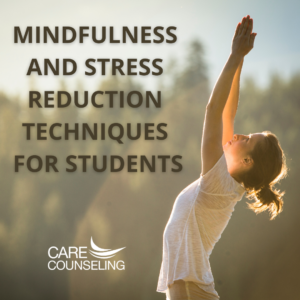Mindfulness and Stress Reduction Techniques for Students
 In the fast-paced world of academia, where assignments, exams, and extracurricular activities often compete for attention, stress can become an all-too-familiar companion for students. However, there is a powerful tool that school counselors can introduce to students – mindfulness. Mindfulness techniques can be a calming balm in the storm of academic pressures, helping students manage stress, enhance focus, and cultivate a sense of inner peace.
In the fast-paced world of academia, where assignments, exams, and extracurricular activities often compete for attention, stress can become an all-too-familiar companion for students. However, there is a powerful tool that school counselors can introduce to students – mindfulness. Mindfulness techniques can be a calming balm in the storm of academic pressures, helping students manage stress, enhance focus, and cultivate a sense of inner peace.
Understanding Mindfulness:
Mindfulness is the practice of being fully present in the moment, without judgment or distraction. It encourages individuals to observe their thoughts, feelings, and sensations with a non-reactive attitude. This approach may seem simple, but its impact on mental and emotional well-being is profound. By incorporating mindfulness into their lives, students can develop a greater sense of self-awareness, emotional regulation, and resilience.
Mindfulness Techniques for Stress Reduction:
- Breath Awareness:
One of the foundational mindfulness techniques is focusing on the breath. School counselors can guide students to close their eyes, take a deep breath in, and exhale slowly. As they do this, they can encourage students to notice the sensation of their breath – the rise and fall of their chest or the feeling of the air passing through their nostrils. This practice helps students anchor their attention to the present moment and promotes relaxation.
- Body Scan Meditation:
Another technique involves a body scan meditation. Counselors can guide students to mentally scan their bodies from head to toe, paying attention to any areas of tension or discomfort. This practice promotes body awareness and relaxation, allowing students to release physical stress they may be holding onto.
- Five Senses Exercise:
Engaging the five senses is a powerful way to ground oneself in the present. Counselors can encourage students to pause and identify five things they can see, four things they can touch, three things they can hear, two things they can smell, and one thing they can taste. This technique swiftly shifts focus away from stressors and into the sensory experience of the moment.
- Mindful Eating:
Students can be taught to savor their meals mindfully. This involves eating slowly, paying attention to the flavors, textures, and smells of the food. By engaging the senses while eating, students can develop a healthier relationship with food and practice mindfulness in a simple, everyday activity.
Benefits of Mindfulness for Students:
- Stress Reduction:
Mindfulness helps students manage stress by interrupting the cycle of rumination and worry. When students practice mindfulness, they become less entangled in anxious thoughts, allowing them to regain control over their emotions and reactions.
- Improved Focus and Concentration:
Regular mindfulness practice enhances students’ ability to concentrate by training their minds to stay present and resist distractions. This is particularly valuable during study sessions and exams.
- Emotional Regulation:
Mindfulness empowers students to observe their emotions without judgment. This self-awareness enables them to respond to challenging situations with greater equanimity, reducing impulsive reactions and promoting emotional resilience.
- Enhanced Well-Being:
Engaging in mindfulness fosters a sense of well-being and self-acceptance. It can help students develop a positive self-image and increase their overall satisfaction with life.
Incorporating Mindfulness Into Student Life:
- Guided Sessions:
School counselors can host guided mindfulness sessions for students, either in person or virtually. These sessions can range from short five-minute practices to longer sessions, providing students with the opportunity to experience mindfulness firsthand.
- Mindfulness Clubs:
Establishing mindfulness clubs in schools creates a supportive community where students can practice mindfulness together. It also provides a platform for discussing the benefits and challenges of incorporating mindfulness into their lives.
- Mindful Study Breaks:
Encourage students to take mindful study breaks. Instead of scrolling through their phones, they can engage in a brief mindfulness exercise to refresh their minds and alleviate stress.
- Homework Mindfulness:
Integrate mindfulness into homework routines. Encourage students to take a few moments before starting their assignments to breathe deeply and set an intention for focused work.
By embracing these practices, students can develop resilience, manage stress, and sharpen their focus, ultimately cultivating a healthier and more balanced approach to both their academic and personal lives.



























